If you’re looking to lose or maintain your weight, the question of “should I weigh myself?” probably lingers in your mind. In this post, you’ll learn the positives and pitfalls and weighing-in options so that you can determine your best approach to the scale.
There I am, at the doctor’s office face to face with The Scale. It’s 10 am. I’ve had breakfast and a cup of coffee (ok, two). Dressed in jeans and a tank top with a cardigan (it’s cold in there!) and a pair of sandals, I step on the scale.
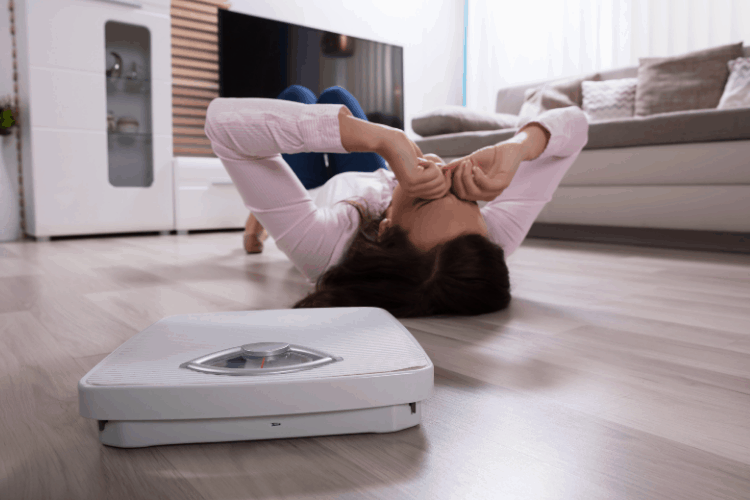
I know full well that the number is going to be high. Well, at least higher than my fresh-out-of-bed-stopped-at-the-bathroom-on-the-way-to-the-scale self.
That knowledge, it doesn’t soften the blow. It feels like a punch to the gut as I watch the nurse continuing to tap the counterweight further and further to the right. Sigh. Why does this number hold so much power?
I am thankful that the weight of the scale is much less burdensome these days. But, I still get taken off guard by an unexpected number from time to time.
Today we are going to discuss if weighing yourself is a healthy and productive practice for you… Does weighing yourself help you lose weight or is it a hindrance?
We’ll dive into some of the fears you may have and uncover your ideal strategy moving forward.
The Weight Of Our Weight
If you are reading this post, chances are pretty good that your weight is an emotional topic for you. You are not alone.
This obsession with our size has spread worldwide. No longer does the scale simply tell us what our gravitational pull to the earth is. It’s not just the sum measurement of our bones, organs, muscles, body fat, water, food intake, and waste.
Nope, it’s much more than that…
For many, the scale speaks to how lovable we are allowed to feel, how “dateable” we rate ourselves, and how successful in life we think we can be. No wonder as a society we are clamoring for a number that says “you’re ok, beautiful.” Now, this may sound dramatic to you but, for many, this is a painful reality.
If this is you, you’ve probably had some pretty negative experiences with the scale.
Maybe it was the annual weigh-in at Grade School where you found yourself being the heaviest student in your class. Or maybe it’s the daily power that the scale has to literally ruin your day. Either way, you aren’t sure if that number is helping you or hurting you, but you are afraid to let it go.
Those Who Benefit From Weighing Themselves
I will start by saying that, for some, the scale is a clear asset. These individuals are able to weigh themselves frequently or infrequently. It doesn’t matter.
The number they see is simply a piece of data. And, they’re able to use that data to make changes in their diet and exercise without any emotional turmoil.
They see, assess, and move on.
These people are the ideal weighing candidates. The information they receive from stepping on that little box yields a positive outcome.
If that is you, weigh on my friend!
3 Reasons We Step On The Scale
We don’t torture ourselves with the scale without reason– we’ve got really good motives for weighing ourselves. But, those ideas, how helpful are they really?
Below we’ll go through several reasons you may be stepping on the scale. Hopefully, this breakdown will help to clarify the role, or lack thereof, that the scale should have in your life.
I’d like to preface this by saying– my goal is NOT to get you to stop checking your weight. My goal is to talk through the reason you weigh yourself so that you can connect to your true motives.
Then you can make a choice about what strategy will help you reach your goals and keep your head on straight.
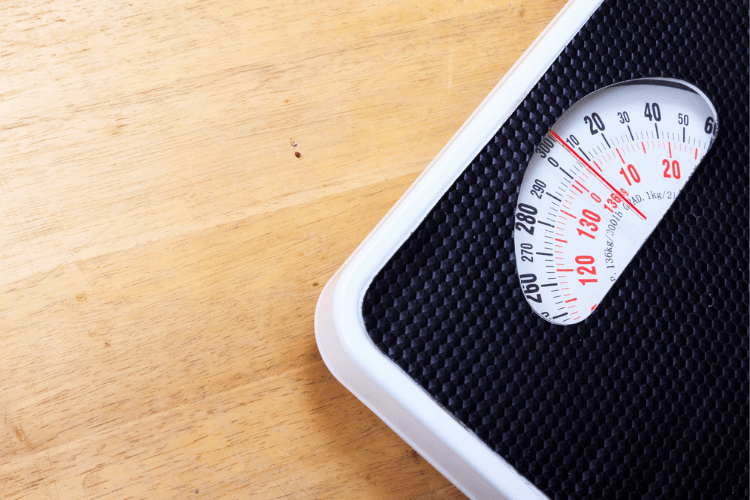
1. “If I Stop Obsessively Weighing Myself, I’ll Just Let Myself Go.”
I get it. I’ve also felt that if I don’t know exactly how much I weigh, I’ll get stuck in the trap of all-or-nothing eating and dive headfirst into a tub of Ben & Jerry’s and never come out.
Do you worry that if you don’t know how heavy you are, you’ll just keep eating? After all, why else would you stop?
What we miss here is the fact that we are responsible adults who have many areas in our lives where we can be trusted without being graded at every turn. Is the only reason you feed and bathe your children to avoid being reported to child protective services?
Heck, you may dislike doing dishes and washing laundry, but you do them (most of the time), right?
To judge that we will only do that which is important to us if we have a task-master forgets the fact that we tend to a lot of responsibilities simply because we appreciate their desired outcome.
If something is truly important to you, you don’t need a digital metal box to tell you to comply.
2. “If I Stop Weighing Myself, How Will I Know When I Reach My Goal Weight?”
This reasoning assumes that the only reason we weigh ourselves is to acquire a specific number. What this assumption misses is that we weigh not for the number but for what that number represents.
Whatever the goal is that you’re shooting for, you’ve got some emotional attachment to it. Maybe this was your high school or wedding weight. Or maybe you just randomly picked a number.
Regardless, inside you feel that reaching that digit is going to improve or even transform your life in some way.
It’s not really the 125,150 (or whatever your “number”), it’s the vision of a confident, energetic, proud, you. The you that you want to be is just wrapped up in a number. By connecting with your deeper reasonings, you can find the motivation that outlasts the temptation to cave in to every candy jar.
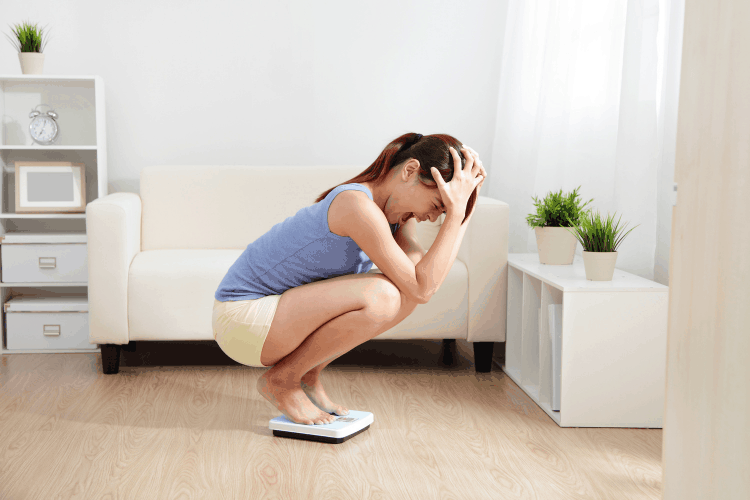
3. If I Stop Weighing Myself, How Will I Know If My Diet Is Working?”
The feedback of your weight can be a helpful tool when you’re looking to lose weight, even in conjunction with learning how to eat better through mindful eating.
Let’s say that you’ve been working on eating when you’re hungry and stopping when you’re full. It’s weigh-in day and you jump on the scale and see that you’ve not lost any weight.
Bummed as you may be, you just got some really helpful feedback. You now know that your approach isn’t placing you in a calorie deficit.
Perhaps your interpretation of hunger and/or fullness could be adjusted. Now you can decide if you would like to tweak the types or amount of foods that you’re eating.
Perhaps you’re content with your current relationship with food.
And then, you could also decide to change nothing at all.
However, you do not need the scale to tell you if your dietary habits are working or not. You can rely on the fit of your clothes and the consistency of your habits to see if you are, in fact, making progress.
Should I Weigh Myself At All?
Reading over the paragraphs above, do you relate to any of the ideas presented? Maybe you’ve found your answer already. If the scale has caused a lot of stress in your life, then it’s quite possible that it brings more harm than good. You acknowledge it’s time to break up and you move on.
However, you may find yourself still unsure of what to do. Below I’ll run through a few weighing strategies. My suggestion is to read through them all and see if one resonates with you. Commit and try it on for size for a bit.
Then you’ll have fresh and consistent data (weight and the outcome of weighing) to assess whether weighing or not is a positive practice for you.
How Often Should I Weigh Myself?
1. Should I Stop Weighing Myself?
Choosing not to weigh at all is a great option for many. Numerous clients have noted how seeing the number has a negative effect regardless of a weight loss or gain.
(If Susie sees that she’s gained weight, she struggles to adhere to her habits since “they aren’t working anyway.” If she sees weight loss, then she gets a little lax with her nutrition because she feels like she has a little wiggle room.)
In this case, progress can be monitored with something as simple as a pair of jeans. Preferably choose a pair that fits well or is even a little snug. Don’t go for your high school jeans though; I suspect that won’t end well. Try these pants on once a month.
Another way to reveal if your diet and exercise program are producing the results that you want is by tracking your habits. This is a powerful practice because it’s what you DO each day that is entirely responsible for your progress or lack thereof.
It’s safe to say that if you are consistently seeing improvements in how you eat and move with food, you are moving closer to your goals.
You can keep a tally of this with a simple pen and paper, an Excel sheet, or an app such as Habit Bull.
2. Should I Weigh Myself Once A Month?
Monthly weigh-ins are nice because 30 days is enough time to see the outcome of the changes that you have made. And, it is frequent enough to make a course correction, if needed.
Just be sure to remain timely so that monthly fluctuations are consistent. If your cycle runs more or less than one month, you may want to adjust accordingly.
The downside to monthly weigh-ins is that our weight can vary a lot from day to day. A salty dinner out or an intense workout that led to muscle edema can easily throw the number off.
If this happens to you, you may want to weigh 3 days in a row, once a month. This will help you get an average weight and a more accurate reading.
3. Should I Weigh Myself Once A Week?
Weekly weigh-ins tend to be the common among fitness progress. This is because frequent monitoring means frequent feedback. This is helpful if the individual is on a more aggressive weight loss plan. For those of us doing it the slow and sustainable way, a week may not be enough time to see results, but it is really nice for seeing the trend over time.
For weekly check-ins, you’ll want to be fairly neutral about seeing that number or else once a week can really throw an unnecessary wrench in your plans. If you can be objective, this may be the method for you.
4. Should I Weigh Myself Every Day?
Daily monitoring of weight has some pretty strong advantages AND disadvantages. While the monthly and weekly weigh-ins work well for many, the daily weigh-in is superb for some and superbly awful for others.
The benefit of weighing daily is being able to see the variations that come from one sunrise to the next.
Anyone who weighs in 365 days a year will tell you that the number can change a lot from day-to-day. As mentioned earlier, there are constant water fluctuations that happen and these can make a pretty significant difference on the scale.
If you’re able to take that number strictly as feedback, daily check-ins may help to quell any anxieties that come when faced with an unexpected spike with less frequent methods.
On the other side of the coin, checking in daily can become a real burden and detriment to success if you’re obsessively weighing yourself. When taking the number to heart, we miss the fact that no one gains or loses pounds of body fat in one day.
If your weight is 2 pounds heavier on Tuesday than Monday, it probably means… nothing. It’s not worth ruining your day or going off your nutrition plan out of frustration for a vanity measurement.
Use daily weigh-ins cautiously.
Measure This Instead Of Body Weight
Whether you determine to step on the scale once a day, never, or somewhere in-between, I’d like you to consider some other forms of measuring progress in your life. Oftentimes the itch to see a change on the scale is a desire to see a change for the positive in our lives.
We want to accomplish more, to know that our efforts are paying off, to be happier, to have a healthy mindset, and all that jazz.
Yes, health is important but what else is important to you? Figure out what your priorities are and measure that.
In Conclusion
No doubt weighing ourselves is a hot topic. While the number on the scale may feel like the most accurate measurement of our health and fitness success, there’s a much broader net to cast that encompasses our joy and quality of life.
By examining your thoughts about the scale and seeing several weighing options, I hope you were able to find a method that felt helpful for you.
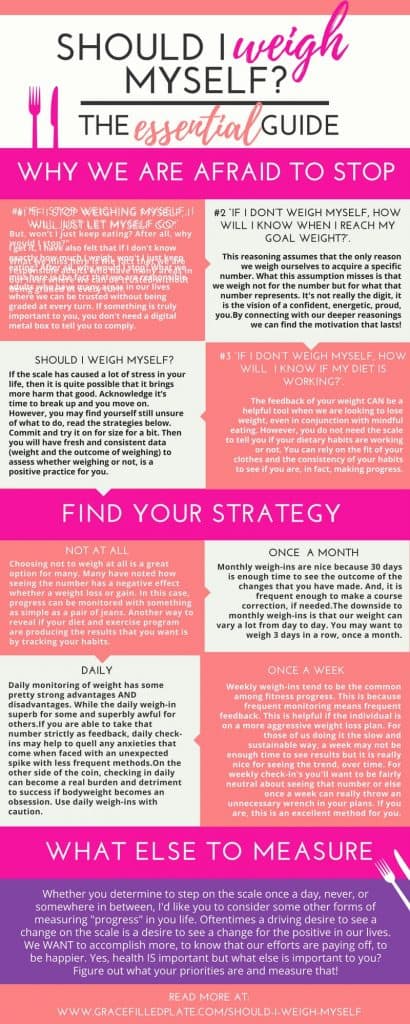
Brandice Lardner is a Certified Personal Trainer, Nutrition Coach, Amazon #1 Best Selling Author, Homeschool Mom, and Jesus Girl whose mission in life is to help women ditch the diet mentality and find peace with food and their bodies so that they are better equipped to do the great things God has called them to do.



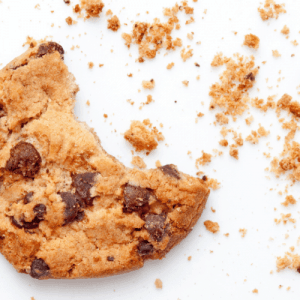

[…] Related Post: What You NEED to Know About Weight Loss and the Scale […]